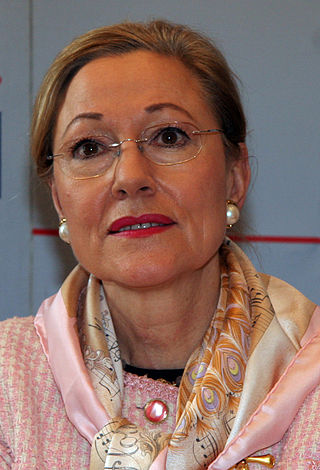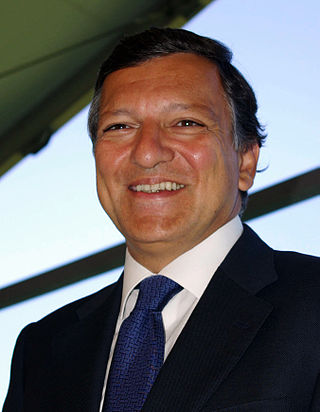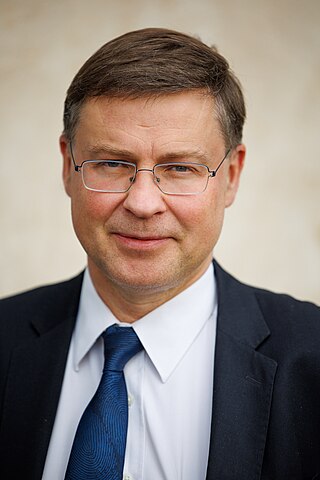
The Common Foreign and Security Policy (CFSP) is the organised, agreed foreign policy of the European Union (EU) for mainly security and defence diplomacy and actions. CFSP deals only with a specific part of the EU's external relations, which domains include mainly Trade and Commercial Policy and other areas such as funding to third countries, etc. Decisions require unanimity among member states in the Council of the European Union, but once agreed, certain aspects can be further decided by qualified majority voting. Foreign policy is chaired and represented by the EU's High Representative, currently Josep Borrell.

Benita Ferrero-Waldner is an Austrian diplomat and politician, and a member of the conservative Austrian People's Party (ÖVP). Ferrero-Waldner served as Foreign Minister of Austria 2000–2004 and was the candidate of the Austrian People's Party in the 2004 Austrian presidential election, which she narrowly lost with 47.6% of the votes. She served as the European Commissioner for External Relations and European Neighbourhood Policy from 2004 to 2009, and as the European Commissioner for Trade and European Neighbourhood Policy from 2009 to 2010.
The European Union has a number of relationships with foreign states. According to the European Union's official site, and a statement by Commissioner Günter Verheugen, the aim is to have a ring of countries, sharing EU's democratic ideals and joining them in further integration without necessarily becoming full member states.

A European commissioner is a member of the 27-member European Commission. Each member within the Commission holds a specific portfolio. The commission is led by the president of the European Commission. In simple terms they are the equivalent of government ministers.

The High Representative of the Union for Foreign Affairs and Security Policy/Vice-President of the European Commission (HR/VP) is the chief co-ordinator and representative of the Common Foreign and Security Policy (CFSP) within the European Union (EU). The position is currently held by Josep Borrell Fontelles.

The Barroso Commission was the European Commission in office from 22 November 2004 until 31 October 2014. Its president was José Manuel Barroso, who presided over 27 other commissioners. On 16 September 2009 Barroso was re-elected by the European Parliament for a further five years and his Commission was approved to take office on 9 February 2010.

Although there has been a large degree of integration between European Union member states, foreign relations is still a largely intergovernmental matter, with the 27 states controlling their own relations to a large degree. However, with the Union holding more weight as a single entity, there are at times attempts to speak with one voice, notably on trade and energy matters. The High Representative of the Union for Foreign Affairs and Security Policy personifies this role.
The Directorate-General for the External Relations was a Directorate-General of the European Commission, responsible for the external policy. The DG was merged into the European External Action Service in 2010, then headed by High Representative Catherine Ashton.

The European Neighbourhood Policy (ENP) is a foreign relations instrument of the European Union (EU) which seeks to tie those countries to the east and south of the European territory of the EU to the Union. These countries include some who seek to one day become either a member state of the European Union, or become more closely integrated with the European Union. The ENP does not apply to neighbours of the EU's outermost regions, specifically France's territories in South America, but only to those countries close to EU member states' territories in mainland Europe.

The European Commissioner for Trade is the member of the European Commission responsible for the European Union's common commercial policy.

The Directorate-General for International Partnerships is the European Commission department responsible for international development policy. It operates under the authority of the European Commissioner for International Partnerships, Jutta Urpilainen.

The Commissioner for Neighbourhood and Enlargement is the member of the European Commission in charge of overseeing the accession process of prospective new member states and relations with those bordering the European Union (EU). The present Commissioner, as of December 2019, is Olivér Várhelyi.

An (Executive)Vice-President of the European Commission is a member of the European Commission who leads the commission's work in particular focus areas in which multiple European Commissioners participate. Currently, the European Commission has a total of seven Vice-Presidents: three Executive-Vice Presidents, three regular Vice-Presidents, and the High Representative who is ex officio also one of the Vice-Presidents.

The Republic of Azerbaijan and the European Union (EU) have maintained a positive relationship through the years and have become more closely linked since 1991. Azerbaijan is currently part of the European Neighborhood Policy, the Eastern Partnership and the Council of Europe. The EU is the largest foreign grant donor to and investor in Azerbaijan, both in the government sector and civil society, making available over 600 million EURO of bilateral EU assistance since 1992.

The European External Action Service (EEAS) is the diplomatic service and combined foreign and defence ministry of the European Union (EU). The EEAS is led by the High Representative for Foreign Affairs and Security Policy (HR/VP), who is also President of the Foreign Affairs Council and vice-president of the European Commission, and carries out the EU's Common Foreign and Security Policy (CFSP), including the Common Security and Defence Policy (CSDP).

Johannes Hahn is an Austrian politician who has served as European Commissioner for Budget and Administration under Ursula von der Leyen since 1 December 2019.

Sir Julian Beresford King is a British diplomat and civil servant who served as the final British European Commissioner from 2016 to 2019 prior to Brexit, having previously served as the British ambassador to Ireland (2009–2011) and France (2016).

The history of the European Union from 2004 to the present is the current timeline of the European Union. It is a period of significant upheaval and reform following the 2004 enlargement of the European Union. The EU has taken on ten new members, eight of which were initially much poorer than the EU average, and took in a further two in 2007 with many more on the way. It created the euro a few years before and had to expand this, and the Schengen Area to its new members. However this was overshadowed by the late-2000s recession and damaging disputes over the European Constitution and its successor, the Treaty of Lisbon. Throughout this period, the European People's Party has been the largest group in the European Parliament and provides every President of the European Commission.

The Service for Foreign Policy Instruments (FPI) is a department (Directorate-General) of the European Commission set up in response to the establishment of the European External Action Service (EEAS). The EEAS merged the Commission's Directorate-General for External Relations (and various other departments) with its counterparts in the Council of Ministers. The responsible Commissioner for the service is the High Representative of the Union for Foreign Affairs and Security Policy Josep Borrell Fontelles in his role as Commission Vice-President. The current Head of Service is Peter M. Wagner.




















